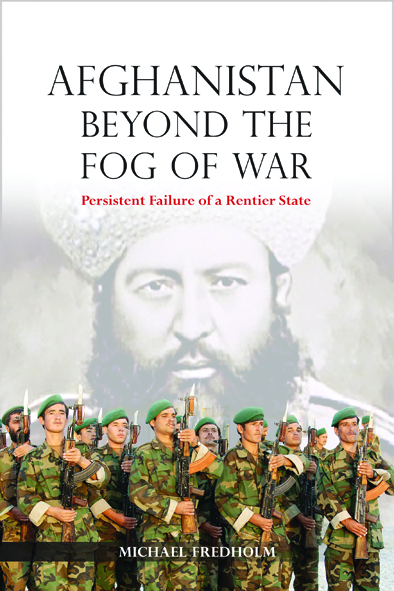Afghanistan Beyond the Fog of War Persistent Failure of a Rentier State
Afghanistan Beyond the Fog of War Persistent Failure of a Rentier State
-First book to scrutinize the root causes of problems with Afghan reconstruction.
- Explores the ebb and flow of institutional development in Afghanistan against the backdrop of foreign involvement in the country.
- Focuses on the power of patronage relations in Afghanistan, and their extension to the international level.
This is the first book to scrutinize the root causes of problems today with Afghan reconstruction. It begins in 1880 with the coming to power of Emir Abdur Rahman and departure of an occupying British army. On the northern border, Russian forces were also poised. Determined to preserve Afghan independence, Abdur Rahman devised a nation-building project grounded on centralized, autocratic rule and based on security, modernization and economic reform.
Though continued by his successors, this project ultimately failed. A key reason for this was that, even as Abdur Rahman implemented policies that might be understood as ‘Western’ and ‘rational’, the great powers of the day took their cue from traditional institutional relationships in Afghanistan; local patronage relations were extended to the international level. In the process, Afghanistan became a rentier state, Abdur Rahman’s model abandoned in favor of foreign subsidies increasingly diverted from security and economic development. Successive foreign powers, especially the Soviet Union and United States, have upheld this centralized, rentier model of governance and development despite it consistently failing over the years.
This work explores dynamics seldom covered in other studies of Afghanistan, including conflict between state-imposed pashtunization and multiple local/ethnic identities, likewise contradictions between the clericalism and secularism deployed in the nation-building process. It explores the largely overlooked ebb and flow of institutional development in Afghanistan, at all levels, in the context of international interest in the country, with special attention to Soviet and US/Coalition strategies and their effects. It also focuses on the power of patronage relations in establishing and retaining control in Afghanistan, and how the extension of such relations to the international level transformed Afghanistan into a rentier state that struggles to unite its people.
Described by one Afghanistan expert as an excellent piece of work, very well documented with close attention to detail, this study offers sober analysis and critical insights. It will interest scholars and students of Afghan affairs plus policy-makers, diplomats, soldiers, international organizations and NGOs, businesses, journalists and many others engaged with Afghanistan and issues of political, military and economic power, democratization and civil–military relations in the region.
- Explores the ebb and flow of institutional development in Afghanistan against the backdrop of foreign involvement in the country.
- Focuses on the power of patronage relations in Afghanistan, and their extension to the international level.
This is the first book to scrutinize the root causes of problems today with Afghan reconstruction. It begins in 1880 with the coming to power of Emir Abdur Rahman and departure of an occupying British army. On the northern border, Russian forces were also poised. Determined to preserve Afghan independence, Abdur Rahman devised a nation-building project grounded on centralized, autocratic rule and based on security, modernization and economic reform.
Though continued by his successors, this project ultimately failed. A key reason for this was that, even as Abdur Rahman implemented policies that might be understood as ‘Western’ and ‘rational’, the great powers of the day took their cue from traditional institutional relationships in Afghanistan; local patronage relations were extended to the international level. In the process, Afghanistan became a rentier state, Abdur Rahman’s model abandoned in favor of foreign subsidies increasingly diverted from security and economic development. Successive foreign powers, especially the Soviet Union and United States, have upheld this centralized, rentier model of governance and development despite it consistently failing over the years.
This work explores dynamics seldom covered in other studies of Afghanistan, including conflict between state-imposed pashtunization and multiple local/ethnic identities, likewise contradictions between the clericalism and secularism deployed in the nation-building process. It explores the largely overlooked ebb and flow of institutional development in Afghanistan, at all levels, in the context of international interest in the country, with special attention to Soviet and US/Coalition strategies and their effects. It also focuses on the power of patronage relations in establishing and retaining control in Afghanistan, and how the extension of such relations to the international level transformed Afghanistan into a rentier state that struggles to unite its people.
Described by one Afghanistan expert as an excellent piece of work, very well documented with close attention to detail, this study offers sober analysis and critical insights. It will interest scholars and students of Afghan affairs plus policy-makers, diplomats, soldiers, international organizations and NGOs, businesses, journalists and many others engaged with Afghanistan and issues of political, military and economic power, democratization and civil–military relations in the region.

Publisher
NIAS Press
ISBN
978-87-7694-250-2; 978-87-7964-251-9
Published
2018
Specialisation
Social Sciences
Theme
International Relations and Politics
National politics
War / Peace
Region
Afghanistan